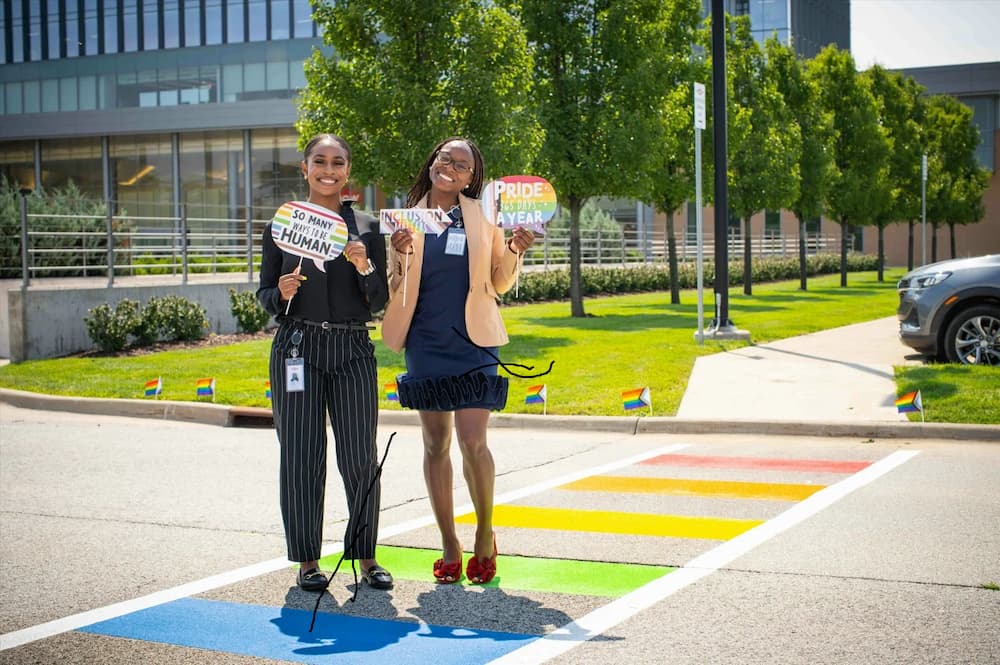
Best Workplaces, Company Culture
The question leaders must answer is: “What is unique about my company, and how do we support our uniquely amazing people?”
What makes a company’s culture great?
Companies from every industry, region, and size are looking for the answer to this question. At the end of the day, building a great workplace culture is about authenticity. The best workplaces are those that stay true to their mission, purpose, and people.
While there are certain foundational components that we see in all great workplaces such as trust, respect, and camaraderie, the details of what a company does to care for its employees provide practical insight into how they achieve their desired culture.
By learning from the best, you can reflect on what resonates with you, your company, and your people. Use these examples as inspiration for building culture with a new program or practice.
10 examples of company culture from top workplaces
1. Employee recognition at Capital One
Recognizing an employee goes a long way to connecting their daily work to the company’s goals and providing the positive affirmation humans crave. At Capital One, the “Onederful Recognition Program” uses “Spot Awards” to recognize associates who deliver on the company’s mission, live its values or go above and beyond in the work they do.
Associates can redeem Spot Awards, which range in value from 15–10,000 points, for gifts, gift cards or cash paid directly through payroll. When associates receive points, they also receive a “Thank You” message from the person who nominated them for a Spot Award.
2. Encouraging new ideas at Publix Super Markets
New ideas are the basis for growth and improvement at any company. To cultivate an innovative culture, companies must instill the sentiment that all new ideas have merit, while also providing honest feedback about both successful and unsuccessful ideas.
Publix’s “Idea Spot” program aims to ensure associates feel heard and valued every time they submit an idea. Whenever an employee submits an idea, Publix’s innovation team acknowledges them and to thanks them for their effort—regardless of whether or not the company decides to implement the idea.
Subject matter experts from applicable business areas determine the viability of each idea. After these experts weigh in on the suggestion, the associate receives a personalized response that either contains next steps (if the idea is being considered for implementation) or an explanation of why the company is not going to move forward with the idea.
3. Friend-first mentorship at NVIDIA
The value of mentorship is undeniable, and there are numerous ways to create the program that is right for your company. At NVIDIA, the Black NVIDIAN Network community group launched a “Friend @ NVIDIA”, or F@N program, to help newcomers quickly soak up the company culture.
F@Ns are cultural ambassadors whose primary role is to be a friend. F@Ns share what it’s like to be an NVIDIAN and introduce new hires to the company’s unique community. All new hires are eligible to request a F@N during their onboarding process.
4. Supporting mental health at American Express
Conversations surrounding mental health at work have been thrust into the spotlight over the past couple of years. American Express’s “Grief and Loss Support” program provides employees with 1-to-1 counseling from licensed therapists as well as access to numerous resources on coping with loss.
In honor of Mental Health Awareness Month, the company rolled out a new campaign: “Here for You. Here for Each Other.” The campaign focused on normalizing the importance of self-care through webinars, blog posts, resources and tools such as talking points for senior leaders. The goal of the campaign is to ensure colleagues understand that it’s okay not to be okay, and it’s okay to ask for help.
The company’s Healthy Minds counselors made themselves available for group counseling sessions with teams who wanted to a create a safe space for discussion of whatever was top of mind.
5. Using technology to create shared connections at Experian
While working remotely has its perks, there’s no doubt that it’s harder to recreate social connection, candor and camaraderie when you’re not in an office.
One Experian employee decided to tackle this issue by creating a “Home-Aloners” group. Group members meet regularly over Microsoft Teams for the sole purpose of connection. In these meetings, colleagues share stories and pictures, pass on hints and tips and support each other through the difficulties that come with working at home.
6. Educating employees on financial wellness at Alston & Bird
Financial literacy is a daunting topic for many, and helping employees make financial decisions can relieve mental stress and lead to better well-being and engagement at work.
Alston & Bird’s “Financial Wellness Month” includes a wide variety of direct programming, from money basics to age-based retirement planning. The company also conducts quarterly investment education seminars to educate participants about the importance of saving for retirement, the advantages of saving in a retirement plan and how to choose appropriate investments.
Classes are designed with specific objectives at various financial sophistication levels as well as for specific target audiences such as individuals approaching retirement or those just starting their careers.
7. Empowering employees to celebrate each other at Nugget Market
Top-down recognition is only one part of the equation when it comes to celebrating employees. Peer-to-peer praise offers another wonderful opportunity to reward employees for a job well done.
At Nugget Market, the “U-Rock” program empowers associates to submit praiseworthy service stories, which show up on digital communication boards for all to see.
Likewise, if any associate sees a teammate doing something worth recognizing, they are encouraged to let them know with a “U Make Us Better” card. These cards let associates know that someone saw and appreciated the fantastic job they’re doing—and enters them into regular drawings for a chance to spin a wheel and win anywhere from $20–$100.
8. Acting on social issues at Nationwide
The opportunities for companies to use their resources to support worthwhile social causes are limitless, and now more than ever, people are looking to their employers to act as leaders in the fight against discrimination.
At Nationwide, the company empowered a group of employees while also working to impact the lives of many for the better. The company’s “Social Justice Task Force,” composed of diverse thought leaders across the company, identifies tangible ways for Nationwide to combat racism and promote social justice.
Twenty-six associates from across the country and all levels of the organization served on the task force to create actionable recommendations in four key areas:
- Education
- Housing
- Employment/economic mobility
- Criminal justice
Each task force member worked on a particular area and was responsible for researching and bringing recommendations to the group. These recommendations serve as jumping-off points for new projects and expanded partnerships with community organizations.
9. Supporting front-line workers at OhioHealth
Finding unique ways to care for those employees who face unique stressors in their day-to-day can be a crucial step toward creating a sense of family and purpose in the workplace.
OhioHealth’s “Adopt-a-Unit” program was born from non-clinical and professional associates recognizing that frontline staff needed support more than ever as COVID-19 cases surged.
More than 37 departments raised their hand to “adopt” a frontline team to provide encouragement through some of their darkest days. Forms of support included handwritten “thank you” notes, public displays of gratitude, snack or meal deliveries and items to support self-care.
10. Personalized touches in onboarding at Kimpton Hotels & Restaurants
While onboarding primarily serves to complete the practical necessities of bringing on a new employee, adding in a sense of human touch can set a tone of belonging and inclusion, especially when you encourage employees to bring their full selves to work.
At Kimpton, onboarding begins with something called a PPP—a “Personal Preference Profile”. Employees are asked to fill out a profile so that everyone can get to know them better immediately.
The PPPs contain a list of questions that vary in complexity and depth: What do you like to do for fun when not at work? What’s your favorite food or snack? Tell us one thing that people would be most surprised to know about you.
The goal is to tap into one of Kimpton’s core values: individuality. The company asks each of their employees to bring their personality, perspective and creativity to work. The PPPs help Kimpton understand each employee’s unique qualities, so they can approach them with understanding and celebrate their individuality.
What defines your company culture?
The examples above reflect different specific company culture practices, but they share one underlying quality: care. Great companies care for their people as humans first, and employees second.
The best way to find out what makes your employees feel cared for is to ask them. With an employee survey you can gain insight into what your employees see as the key areas necessary to build the foundation of care and support that we see at all great company cultures. Ask us about how we can help you build a great company culture today.










